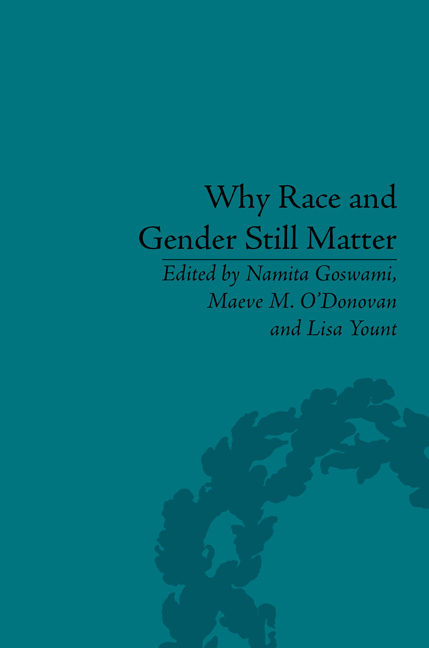Book contents
- Frontmatter
- CONTENTS
- Dedication
- Acknowledgements
- List of Contributors
- Introduction to Why Race and Gender Still Matter: An Intersectional Analysis
- Part I Defining Intersectionality
- Part II Doing Intersectionality
- 6 Continental Feminist Philosophy Meets Intersectionality: Rosi Braidotti's Work
- 7 Purposeful Nonsense, Intersectionality and the Mission to Save Black Babies
- 8 Transitional Subjects: Gender, Race and the Biopolitics of the Real
- 9 Caster Semenya: Reasoning Up Front with Race
- 10 Philosophical Happiness and the Relational Production of Philosophical Space
- 11 Theory Can Heal: Constructing an Ethos of Intervention
- Notes
- Index
6 - Continental Feminist Philosophy Meets Intersectionality: Rosi Braidotti's Work
from Part II - Doing Intersectionality
- Frontmatter
- CONTENTS
- Dedication
- Acknowledgements
- List of Contributors
- Introduction to Why Race and Gender Still Matter: An Intersectional Analysis
- Part I Defining Intersectionality
- Part II Doing Intersectionality
- 6 Continental Feminist Philosophy Meets Intersectionality: Rosi Braidotti's Work
- 7 Purposeful Nonsense, Intersectionality and the Mission to Save Black Babies
- 8 Transitional Subjects: Gender, Race and the Biopolitics of the Real
- 9 Caster Semenya: Reasoning Up Front with Race
- 10 Philosophical Happiness and the Relational Production of Philosophical Space
- 11 Theory Can Heal: Constructing an Ethos of Intervention
- Notes
- Index
Summary
Kathy Davis argues that intersectionality appears to be an ideal ‘traveling theory’. Kimberlé Crenshaw coined the term in the context of US African American feminism in 1989, and since then intersectionality has become‘a buzzword’, both in the United States and among European feminists. Crenshaw has since expressed unease with certain feminist adoptions and adaptations of intersectionality, and her concern should be heeded. Crenshaw worries that as intersectionality travels beyond its original discursive, political and historical location, its primary original aim – to bring to the forefront the constitutive role of race in the lives of women, in particular, women of colour – might get ‘lost in translation’. She is not mistaken. At the same time, there is merit in the insistence of European feminist theorists, such as Helma Lutz, Mary Evans, Kathy Davis and Nina Lykke, on the usefulness of adopting an intersectional approach in new contexts, in particular, using it as a tool in transversal dialogues and ‘intraactions’ between differently positioned women across Europe. Insofar as the newer intersectional feminist projects insist on interrogating and foregrounding power differentials among women and seek to ‘reconfigure collectivities towards transformative action’ (Crenshaw's preferred use of intersectionality), they serve a vital function.
The present essay examines examples of the work intersectionality has been deployed to do 7 by Utrecht-located, Continental feminist philosopher Rosi Braidotti in her search for an adequate response to an increasingly polarized, post-9/11, political climate in the Netherlands.
- Type
- Chapter
- Information
- Why Race and Gender Still MatterAn Intersectional Approach, pp. 87 - 100Publisher: Pickering & ChattoFirst published in: 2014



